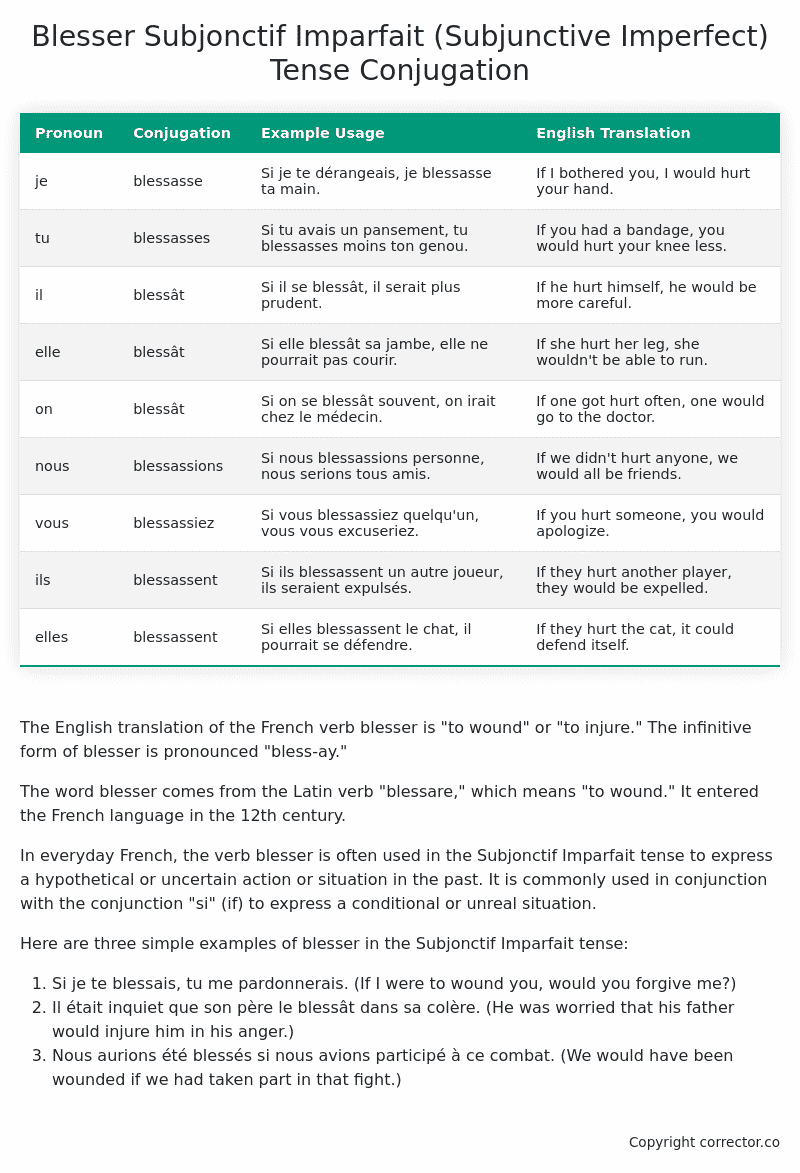Subjonctif Imparfait (Subjunctive Imperfect) Tense Conjugation of the French Verb blesser
Introduction to the verb blesser
The English translation of the French verb blesser is “to wound” or “to injure.” The infinitive form of blesser is pronounced “bless-ay.”
The word blesser comes from the Latin verb “blessare,” which means “to wound.” It entered the French language in the 12th century.
In everyday French, the verb blesser is often used in the Subjonctif Imparfait tense to express a hypothetical or uncertain action or situation in the past. It is commonly used in conjunction with the conjunction “si” (if) to express a conditional or unreal situation.
Here are three simple examples of blesser in the Subjonctif Imparfait tense:
- Si je te blessais, tu me pardonnerais. (If I were to wound you, would you forgive me?)
- Il était inquiet que son père le blessât dans sa colère. (He was worried that his father would injure him in his anger.)
- Nous aurions été blessés si nous avions participé à ce combat. (We would have been wounded if we had taken part in that fight.)
Table of the Subjonctif Imparfait (Subjunctive Imperfect) Tense Conjugation of blesser
| Pronoun | Conjugation | Example Usage | English Translation |
|---|---|---|---|
| je | blessasse | Si je te dérangeais, je blessasse ta main. | If I bothered you, I would hurt your hand. |
| tu | blessasses | Si tu avais un pansement, tu blessasses moins ton genou. | If you had a bandage, you would hurt your knee less. |
| il | blessât | Si il se blessât, il serait plus prudent. | If he hurt himself, he would be more careful. |
| elle | blessât | Si elle blessât sa jambe, elle ne pourrait pas courir. | If she hurt her leg, she wouldn’t be able to run. |
| on | blessât | Si on se blessât souvent, on irait chez le médecin. | If one got hurt often, one would go to the doctor. |
| nous | blessassions | Si nous blessassions personne, nous serions tous amis. | If we didn’t hurt anyone, we would all be friends. |
| vous | blessassiez | Si vous blessassiez quelqu’un, vous vous excuseriez. | If you hurt someone, you would apologize. |
| ils | blessassent | Si ils blessassent un autre joueur, ils seraient expulsés. | If they hurt another player, they would be expelled. |
| elles | blessassent | Si elles blessassent le chat, il pourrait se défendre. | If they hurt the cat, it could defend itself. |
Other Conjugations for Blesser.
Le Present (Present Tense) Conjugation of the French Verb blesser
Imparfait (Imperfect) Tense Conjugation of the French Verb blesser
Passé Simple (Simple Past) Tense Conjugation of the French Verb blesser
Passé Composé (Present Perfect) Tense Conjugation of the French Verb blesser
Futur Simple (Simple Future) Tense Conjugation of the French Verb blesser
Futur Proche (Near Future) Tense Conjugation of the French Verb blesser
Plus-que-parfait (Pluperfect) Tense Conjugation of the French Verb blesser
Passé Antérieur (Past Anterior) Tense Conjugation of the French Verb blesser
Futur Antérieur (Future Anterior) Tense Conjugation of the French Verb blesser
Subjonctif Présent (Subjunctive Present) Tense Conjugation of the French Verb blesser
Subjonctif Passé (Subjunctive Past) Tense Conjugation of the French Verb blesser
Subjonctif Imparfait (Subjunctive Imperfect) Tense Conjugation of the French Verb blesser (this article)
Subjonctif Plus-que-parfait (Subjunctive Pluperfect) Tense Conjugation of the French Verb blesser
Conditionnel Présent (Conditional Present) Tense Conjugation of the French Verb blesser
Conditionnel Passé (Conditional Past) Tense Conjugation of the French Verb blesser
L’impératif Présent (Imperative Present) Tense Conjugation of the French Verb blesser
L’infinitif Présent (Infinitive Present) Tense Conjugation of the French Verb blesser
Struggling with French verbs or the language in general? Why not use our free French Grammar Checker – no registration required!
Get a FREE Download Study Sheet of this Conjugation 🔥
Simply right click the image below, click “save image” and get your free reference for the blesser Subjonctif Imparfait tense conjugation!

Blesser – About the French Subjonctif Imparfait (Subjunctive Imperfect) Tense
Formation
Common Everyday Usage Patterns
Interactions with Other Tenses
Subjonctif Présent
Indicatif Passé Composé
Conditional
Conditional Perfect
Summary
I hope you enjoyed this article on the verb blesser. Still in a learning mood? Check out another TOTALLY random French verb conjugation!


